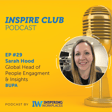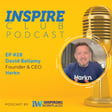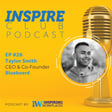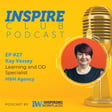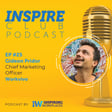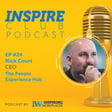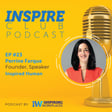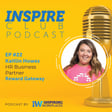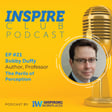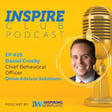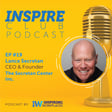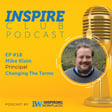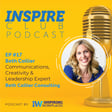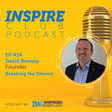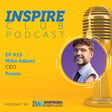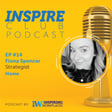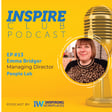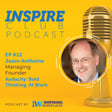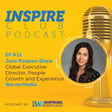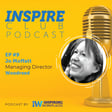Become a Creator today!Start creating today - Share your story with the world!
Start for free
00:00:00
00:00:01

Inspire Club EP #10 - Kelly Swingler
In this episode we talk with Kelly Swingler. Founder of The Chrysalis Crew.
Kelly is a beacon of positivity and knowledge in HR for many around the world. Kelly is also the co-founder of Inspire: London, the London-focused community of Inspiring Workplaces. We hope to have our first socially-distanced meeting some time in September.
In her chat with Matt, Kelly reveals some of the potential struggles with transitioning your organisation to a 4 day work week. And why it is important not to answer your emails late into the night.
This episode is powered by Waggl – Waggl is an agile and comprehensive Employee Voice platform that measures, and truly improves engagement.
We hope you enjoy it.
Recommended
Transcript
Podcast Introduction
00:00:00
Speaker
Hello and welcome to the latest episode of the Inspire Club by Inspiring Workplaces. Our podcast is supported by Waggle. Waggle is an agile employee voice platform that measures and truly improves engagement. And as always, just thank you to them for their
00:00:16
Speaker
that support throughout what is an ongoing saga. So
Meet Kelly Swindler
00:00:21
Speaker
until our guest quickly, founder of Christmas Consulting, a beacon of positivity and knowledge in HR for so many around the world. And I almost forgot, actually. She's also the co-founder of Inspire London, the London focused community of inspiring workplaces. And our first gathering is going to be sometime socially distant and safe in September. So watch this space.
00:00:44
Speaker
But please welcome the one and only Kelly Swindler. How are you doing? I'm very, very well. How are you? Really, really excited to speak to you today.
00:00:52
Speaker
Yeah, really excited. I've known you for so long. And yeah, just really, really excited to get stuck into this podcast really. So why don't we? Why don't we? First,
Inspiration at Work
00:01:05
Speaker
the only rule of Inspire Club, as most people know now, isn't like Fight Club. It's not to talk about Inspire Club because we want as many people as possible to know about this thing.
00:01:16
Speaker
but it's actually to share a story of someone who's inspired you at work along the way and just giving kudos and why.
00:01:25
Speaker
Yeah okay so I suppose again I've been thinking about this long and hard since you kind of asked me to be a guest on this and I could probably talk for an entire day about all of the people that have inspired me at work. I think there are genuinely so many but I think one that really really stuck with me was very very early on in my career and it was a woman called Gail Powell
00:01:50
Speaker
She was staff and training manager when I first joined Waitrose and she was involved in my entire recruitment process, the endless assessment centres that I had to go through. And then when I was appointed was really my kind of staff and training point of contact. So she was like, you know, my HR contract was really responsible for all of my training.
00:02:13
Speaker
And what I like, and I think it was really her when I was kind of thinking right back to it, it was her that really was part of that inspiration to start me off on my HR journey. So when I kind of started my career, initially it was in, you know, kind of retail management, and I was then going to specialise in an area at the end of a kind of two year programme.
00:02:37
Speaker
And really from day one, from that assessment centre, I knew that that was, it was the kind of, as Waitrose called it, the kind of staff and training routes, the HR route that I wanted to take based on her passion, her enthusiasm, her kindness, her knowledge. Everything that I saw in her was totally different to everything that I had seen in kind of HR, everywhere else that I kind of worked kind of part time,
00:03:06
Speaker
very, very different to all of the stories that I heard about HR from all of my friends and family and colleagues and all of that sort of stuff. Gale was just that
Changing the Work World
00:03:16
Speaker
pinnacle of this is a really inspirational person that actually cares about people, wants to ensure that they are, you know, come developed and trained in the right way. And so I suppose without Gale, I may never ever have started in the kind of HR space.
00:03:32
Speaker
Wow. Well, that's a big cause. I think that we never would have had Kelly Swingler of today without Gail. That would have been a huge loss. No, she left the John Lewis partnership and I have been trying to track her down. So if anybody knows a Gail Powell that used to live, I think she looked at me at Sway actually, but was kind of working for the head office down in Berkshire. If anybody knows Gail Powell,
00:04:02
Speaker
I would absolutely love to speak to her again. Is that the head office? I was in Bracknell. It is, yeah. Bracknell head office. So she was working there. She had a regional role. And I do think from memory that she lived in Sydney. And so if anybody knows Gail Powell, who back in like late 90s, used to work for Waitrose, part of the John Lewis partnership, I'd love to have a chat with her and say thank you.
00:04:27
Speaker
Absolutely. So everybody listening, Gail Powell, we're going to go on the hunt too, because I think she needs to listen to this podcast because she needs to hear those words. I think that's amazing that she has such an impact on such another human being and we thank her for it being Kelly. So thank you. So having met Gail and gone down the path you've gone down, what's your personal why? What drives you on a daily basis?
00:04:55
Speaker
It's absolutely to change the world of work. I think that was the big driving force for me. And again, I think from those first introductions with Gayle and then going on through my career, I think the thing that really started to drive me back in the early days of my HR career
00:05:12
Speaker
was what I used to kind of, and I still do talk about really, but it's kind of stopping this like Monday to Friday dying syndrome that so many people go through on a daily basis. So it's, you know, like start work on Monday, wish it wasn't Monday, you know, get to Tuesday and kind of, you know, we've still got four days of the week left to get to Wednesday and then kind of, we've got three days left of the week.
00:05:35
Speaker
get to Thursday and actually realise we've only got two days left so actually we better knuckle down and get some work done and then Friday can't finish early because I've got to do all of the work that I've been procrastinating on for a week so I don't want to be here. I think that was one of the biggest drivers. I used all of my family, I used to get it, if I'd go to the hairdressers
00:05:55
Speaker
the people in the chairs sat next to me would be moaning to the hairdresser about their boss and what was happening at work and how awful it was. You'd go to the pub with friends and they'd be moaning about their boss or you know their partner's boss or their kid's boss you know just everybody kind of doing this moaning.
00:06:13
Speaker
and I genuinely believe that there had to be a better way to do this work thing that actually if we could be inspired and motivated and be led in the right way and managed in the right way and developed in the right way we would change the world of work but ultimately we would also change everything that goes on for us outside of work. So you know if we're miserable at work actually what impact is that having in our relationships and our families and
00:06:39
Speaker
you know everything that we choose to do whereas actually if we were motivated and inspired and really looked forward to going to work and did work that we enjoyed the bigger impact of what that would be so so my why my driver as it has been for
00:06:56
Speaker
over 20 years now and I know I only look 21. But my driver for that has been to change the world of work and to genuinely stop this Monday to Friday dying syndrome.
00:07:14
Speaker
And everybody's known it, that it's such a big challenge to overcome. We're basically going to try and change the way society operates and how we work. And people just want to focus on, and understandably, let's just fix work and make sure we're doing that nine to five Monday to Friday and talk about something that we needed. This pandemic has just smacked everybody in the face in the sense of
00:07:38
Speaker
Well, we can't ignore this. Actually, this work does impact outside of our working hours. And now it's impacting the CEOs, and they're at home, and they're around the dining tables. And they're going, actually, we're making this change. And a lot of them are hopefully not
The Four-Day Work Week
00:07:54
Speaker
going to revert to type and say, there's a better way. We can still extract performance, but make people happy. We can give them the flexibility and give them
00:08:06
Speaker
the better lifestyle that they want, you know, so I'm hoping that happens. Have you moved to a four-day week during this period? Have I got that? Yes, well, not during this period, so we started four-day working back in January 2019, so we've been going four-day working now since, yeah, two years, so since January 2019. I would never ever go back to a five-day week. Never go back? No, never ever.
00:08:35
Speaker
So, because I'm a huge advocate of it. I remember I've said this on the podcast for about 20 years ago in a job, I asked my boss if I could have every other Friday off or Monday off as taking up my leave in that way, 25 days. And they just laughed at me and said no. But I thought it'd give me a better lifestyle.
00:08:58
Speaker
Any things to avoid transitioning to a four-day week for those thinking about it right now? Any things you had to overcome or didn't think would happen? Yeah, I mean loads. I think at the time we were at a point in the business I really wanted to be able to give back to the team and of course we were looking at do we give bonuses, what could pay rises look like, all of those sorts of things and
00:09:26
Speaker
I think for a lot of that, what you'll know from all of the research, bonuses don't necessarily do anything for us in terms of engagement or any of those sorts of things. And there was some talk at the time about this four-day working.
00:09:43
Speaker
And I had known lots of people and was, you know, was working within in kind of partnerships, some people that were in corporate who were either working, say, nine day fortnight or condensed hours or lots and lots of different things. And what I recognise within those people, all of whom have now gone back to a full time working pattern, was that although they were working these nine day fortnight or condensed hours to allow them to take more time off with their families,
00:10:12
Speaker
They then ended up working additional hours on top of the hours that they were working to then end up getting the job done. So we made a decision very early on that we would actually close the business one day a week to ensure that our people were not working on that day. Again, we looked at kind of stats and all of those sorts of things.
00:10:37
Speaker
spoke to the team and did a little bit of research and I think initially we could have said okay so we'll close every Friday but I think mentally again my concern was if we worked Monday to Thursday and everybody took a Friday off we could still end up working on the Friday if we haven't finished everything that we needed to do Monday to Thursday and there was something psychological there
00:11:01
Speaker
We made the decision to close on Mondays. At first the team really welcomed it but the biggest challenge I think for all of us was getting over a lot of the guilt because all of my team have come from corporate backgrounds and in corporate backgrounds you kill yourself 60 or 80 hours a week, work, work, work.
00:11:23
Speaker
And actually if you're not killing yourself doing 60 hours a week you're probably not working hard enough or you're not going to be successful enough or you're not going to get your promotion or you're not going to get your pay rise or any of these sorts of things. And the biggest challenge for all of us, myself included, was letting go of that guilt and that feeling of I should be doing something today.
00:11:43
Speaker
maybe I could just check my email, maybe I could just go into social media, maybe I could just reach out to a few clients, maybe I could do all of this stuff because I want to feel, you know, I want to feel like I'm doing something. And that was the biggest challenge for all of us within the team. Whereas I think at first time, I kind of thought actually we're giving everybody like a gift of time, which actually many of us would say that we're really grateful for.
00:12:11
Speaker
But actually then when it comes to it, what do we do with that time?
00:12:15
Speaker
And that was the biggest challenge for lots of us. So some people then started doing volunteering stuff. I was already doing some volunteering, so I moved some of that to Mondays. But I found initially I was packing my Mondays with stuff so that I felt it was really productive. And even for me, it took me probably six or eight months to realise that I don't have to be filling the day. I can just have a day and I can have a day to do what I want with.
00:12:42
Speaker
whether that's filling it or doing nothing. And that was the biggest challenge. And I think, you know, we're going for lots of people. I don't necessarily think full day working would work for everybody. And I don't necessarily think every organisation
00:12:56
Speaker
could or should or would close their entire business for a day. But really, really speak to your people and help them with that transition. Help them let go of some of that guilt. Let them know that it's okay to not be working. Let them know that it's okay to be looking after themselves. And really push that. This is your time.
00:13:19
Speaker
That could be a benefit that people choose. That could be an option. I love that. It's so helpful, I think, for people listening in to hear what you went through. Because when you're talking about guilt, the word I went for was I'd probably be anxious and anxiety of not doing something.
00:13:39
Speaker
because we're seriously looking at it. We want to practice what we preach and we do as much as we can, but we're looking at the four-day week in a really big way because I think all the benefits are clear really. And I'm really grateful for you for giving us an insight on what you went through. Yeah, totally. I do think it's a big thing. We do follow the, I suppose if you like, the four-day week principle. So it is 100% pay for 80% of the hours worked.
00:14:07
Speaker
Again, I think from other people that I've spoken to, I think there is the assumption that it's part-time working or that it is condensed hours and it's none of those. It is 100% pay for 80% hours worked and that works for us, that works for our people.
00:14:25
Speaker
And not lying, I haven't heard anybody who's gone there and regretted it so far. And if there are people out there who have tried it and it's not been for them, please get in touch with me. Because I'd like to know why. But so far, people like Perry Timms have just gone and done it during lockdown and only so far, great feedback. So I'd love to hear from you.
00:14:51
Speaker
So thank you so much. That wasn't one of our usual questions. I want to get back to a couple of them because I think people like to hear different contrasting people and their take at work. What's the best advice you were ever given and who was it from? Best
Work-Life Balance Advice
00:15:07
Speaker
advice I was ever given was from one of my bosses, a lady called Alison Suffolkan, who told me to stop emailing out of work hours.
00:15:18
Speaker
Um, and she did so in a way. So I was, uh, I can remember one night I was preparing for a board meeting, had got back from London quite late, wanting to make sure that I had all of the information ready for this board meeting the following day, 11 o'clock at night. I'm going through all of the papers. I'm making sure I'm absolutely fully prepared and into my inbox came this email from Alison.
00:15:41
Speaker
And I responded immediately and she immediately wrote back, so I'm not even going to read your response. Never, ever, ever reply to an email this late at night again, because if you start to do it, just because I choose to work at this time of night doesn't mean that you do. But the expectation will be if people know that you email at all hours, people will start to email you at the time that is right for them.
00:16:07
Speaker
and you may then feel that you have to respond. So never, ever, ever, and I responded, you know, really great advice, Alison, thank you. And she emailed me straight back to say, you've just responded. I told you not to stop it. And I was like, has that stuck?
00:16:25
Speaker
Yeah, and again, I think, you know, from a team perspective perspective, what I think is really, I mean, again, we work a full day week, people now are familiar with that. So we'll get messages from people on Monday, you know, I know you don't work Mondays, but I just wanted to let you have this or I know you don't work Mondays, but I wanted to make sure, you know, that you kind of have this for Tuesday morning or whatever. So there is that kind of expectation.
00:16:48
Speaker
Within those four days, I and the rest of the team, we do tend to work quite flexibly. So again, I may start work at six o'clock in the morning, some nights, and I may have some nights where I'm working until kind of six or seven o'clock. That doesn't mean I expect any responses. And I think, again,
00:17:06
Speaker
Getting that message, you know, that's very clear with the clients that we work with. That's very, very clear across the team. I absolutely do not expect an immediate response to emails. I think if you're expecting an immediate response to something, don't send an email would be my kind of advice. You know, if you want an instant response for me, email is the worst way to do it. Like drop me a text, drop me a WhatsApp, you know, give me a phone call. If I'm available, I'll answer.
00:17:34
Speaker
But just because you email me at a time that is right for you does not mean that I'm going to respond at the time that's right for you and respond at the time that's right for me. And yeah, I think that was the starting point for that journey. So yeah.
00:17:48
Speaker
I'm hoping as a society we're getting a bit better at that because at one point a couple of years ago, my out of office was on holiday and people just didn't even observe the out of office. I'd have an email come back and I'd come back like three emails from this same person and the last one was they were really angry.
00:18:10
Speaker
Have you made my out of office? I'm not here. And they were genuinely really upset. Yeah and I think again as the world of work changes and we do start to move to more flexible hours and again I think hopefully the last 12 months during this pandemic has also taught us you know we may be
00:18:32
Speaker
reading to our kids, we may be out walking the dogs, we may be taking some down time. I've spoken to lots of people, actually it's easier for them to do a couple of hours pre the kids getting up in the morning.
00:18:45
Speaker
then be able to get the kids set up and ready for school. So they're really flexing and tweaking their days. And I think sometimes we need to set that expectation. I know some of my clients, just like you've said there, within five minutes of somebody sending them an email, they've got another email or a text or a Slack or whatever communication challenge, but I've just sent you an email and you haven't responded.
00:19:08
Speaker
You know, it's like, you know, come on, we've got to get better at this. We do, we do. And I'm all for people being given the flexible blocks of time now. It's all about productivity. So if you work better between six and two, and that's the hours you want to work, then go for it. You know, if I don't get what I really want to get done that day done before 9am, it's not going to get done. And then I start getting all anxious and, you know, irritable.
00:19:37
Speaker
I'm a hoot, basically. What do you think the most important quality in a leader is from your perspective? Honesty, I think, is a big one for me. I think that's honesty in terms of your listening, honesty in terms of the way you communicate, honesty in terms of your actions. I just think for me, it's honesty. If you don't know something, say it.
00:20:07
Speaker
If you don't agree with something, say it. If you do agree with something, say it. If you want to give somebody praise, say it. And I think honesty, it's really important to me in terms of my own values. It's something that I value very, very much in other people. And I think the more honest our leaders can be, the more open and honest the communications are that we can have with them. I think it's fundamental to building trust.
00:20:35
Speaker
and really fundamental to everything that underpins them in our organisations and our work. I think it's critical in terms of the culture that we create, the behaviours, the work, all of the kind of communication, the way in which we're rewarded, developed, everything. I think for me, honesty just kind of sits at the core of everything.
00:20:56
Speaker
Ah,
Leadership and Honesty
00:20:57
Speaker
I love it. Absolutely love it. And I almost think you've got a little slogan there. Just say it. I think that's a great, great principle to live by. And, you know, flicking that round. I missed it on my website. Trademark that now. Trademark, yes. But I was thinking that from the other way around, I've always said that
00:21:22
Speaker
excuse my language but you know honestly but no no bullshit um it it's it simplifies life you know if you're open and honest with people then life just gets so much easier absolutely absolutely
00:21:38
Speaker
So I love that, and I fundamentally agree with you. So let's, well, one last work-based question, then we'll get to the more practical stuff. What's your go-to productivity trick?
Productivity Tips
00:21:54
Speaker
Oh, time blocking my diary, definitely. Blocking out my diary. So I literally, if, and I said this, if it's in the diary, it's done.
00:22:06
Speaker
If it's not in the diary, it's probably not going to happen because again, like you, you know, I kind of, everything changes. So if it's in the diary, it's done is, is kind of my, I suppose, my mantra really. And so literally I have block times for everything. So block times for my yoga in the mornings. I have block times for the times that I eat throughout the day. I have block times for when I walk the dog. I have time blocked out for clients. I have time blocked out for these sorts of conversations.
00:22:35
Speaker
I have time blocked out for new business calls and client calls. What you were saying there, if somebody's most productive between six and two, my diary really is blocked out based on
00:22:50
Speaker
when I am at my most productive, when I am at my most communicative, you know, the times that I'm able to have these sorts of conversations throughout the day. You know, my writing is usually first thing in the morning. That's one of my kind of, you know, quiet activities. And so you block, you know, block timing that. If it's in the diary, I stick to it. I do also allow time for flexibility. So I allow time for the ad hoc stuff.
00:23:18
Speaker
I allow time for maybe some of the stuff that isn't in the diary and actually really, really needs to get done. But I make sure that I've got that blocked out. And if it's in my diary, then I will absolutely make sure it gets done. Fantastic. A big fan of it myself. That's my go-to trick. I'm just not brilliant at it yet. It really helps me, but I just haven't perfected it yet. So I'm working on it.
00:23:47
Speaker
Well and again like everything is you know I think everything is for me everything is practice I don't think we necessarily have to get it right first time and I think we can grow and develop it. I tried it years and years ago and it didn't work at all and then actually I found a different way of doing it for myself that really works and then I've been able to you know to kind of kind of get back into it so you know for me it's all practice it's all practice.
00:24:11
Speaker
Love it. I love it. So, flicking the switch to the other side when we're not working. A few quick questions. If you're a teacher, what would you teach?
Well-being Focus
00:24:26
Speaker
Well-being. I think mental well-being, mental and physical well-being.
00:24:31
Speaker
Awesome. Fantastic. I might need your help there on the physical side of things because I've let myself go big time in the package. That's my one goal this year. Yeah, we all have some extent. Let it happen. We'll all get back on track.
00:24:48
Speaker
Yeah, no, that's the goal by the Christmas. I'm giving myself a long time to get back in shape. Early bird, I think I might know the answer to this one, but early bird or night owl? Yeah, early bird for sure. If I'm up between five and six, it's a good day. There are some mornings where the alarm will get turned off and I'm up between, say, seven.
00:25:09
Speaker
My days are just totally different and I think any time, you know, and that's not to say I definitely have some times and definitely during kind of 2020 with the whole kind of lockdown thing and Netflix binges. If I'm, you know, if I'm really engrossed in something, I can sit on just watch and watch and watch and watch, but I am not at my best the next day. So you know, for me, I have a really kind of strict
00:25:34
Speaker
nighttime routine, if you like, to make sure that I'm prepared, ready for my sleep, good night's sleep, and then I can, you know, I'm kind of firing on all cylinders the following day. Yeah, it's been brought into stark focus. I always knew that lockdown, sleep is the number one priority. If that's not in tune, I'm fully out of whack. And we all are, and I think we underestimate just how important sleep is for us.
00:26:03
Speaker
Yeah, yeah, I agree, totally. So this is a really hard question, so I'm not going to hold you to it, but your favourite album and then your go-to song, if you just need to fire yourself up for work or yoga or whatever it might be, go-to song would, depending on who's listening, it may need that explicit advisory that we used to get across all the front of our CD covers in the 90s.
Kelly's Favorites
00:26:31
Speaker
uh so uh explicit advisory my go-to song would absolutely be hustle by pink oh awesome yeah my favorite album again i think this really i was i was really struggling with this one because i think it very much depends on my mood but if i really sit and think about it it would absolutely be madonna's immaculate collection oh yes yeah
00:26:57
Speaker
Yeah, I unashamedly love that album. So good. Express yourself. It's brilliant. I was watching last week, one of my sons, bless him, has been working from home with his mother throughout the whole of lockdown, but we have been getting into some quiz shows together.
00:27:19
Speaker
And the only round that I have been able to answer in full on Pointless, which I think was last week or the week before, was it was Immaculate Collection songs, but they'd replaced all of the vowels with M's for Madonna. And that was the only round that I've ever got 100% on on any of the songs. And I was so proud of myself.
00:27:44
Speaker
Fantastic, absolutely fantastic. That's an album, I know every track, that's my mum's favourite album. I grew up on that, so. It's brilliant. Yeah, so good, so, so good. What's the funniest thing that's happened to you recently that you can share?
00:28:04
Speaker
I don't know and because again I was kind of wrecking my brains with this one and I really cannot remember what it was but I do remember kind of last week just laughing hysterically at something that I had said
00:28:19
Speaker
to my son and my partner and his kids. And it just, I was kind of laughing for almost an hour at whatever it was. And it was something ridiculous that I said. So I can't remember the thing. I think it's one of those, you can't always remember what somebody said, but you can remember how it made you feel. And it was one of those type moments. I found it really hilarious, but I couldn't actually tell you what it was.
00:28:48
Speaker
I love the fact that it's you who made you laugh as well. It was brilliant. Which is always good. Favourite film that you can just turn on and watch? Again, there are so many and I really do think that depends on my moods and also who I'm watching with. So if I'm with my sons, that could be like anything Star Wars related, that could be any of the kind of Marvel films.
00:29:18
Speaker
um it could be like Shawshank Redemption, it could be Green Mile, it could be any of the kind of Disney films so I think in terms of films that really does depend on mood. I think on my mood I think we're having a bit of a um kind of rehash and we have been doing this sort of since Christmas of over kind of Guy Ritchie films and Quentin Tarantino films because my oldest stepson hasn't seen a few of those so we're going through some of
00:29:43
Speaker
what I would deem to be, you know, classic films of my teens, really. But yeah, I think it depends on the mood and who I'm watching it with, but I can do anything from kind of rom-com to kind of cult classics to action to anything. Well, I'm going to put you on the spot now then and say, what's your favourite Tarantino? Oh, favourite Tarantino. I've got to go Pulp Fiction.
00:30:09
Speaker
Well, that's an absolute classic, isn't it? You can't fault any of them, but I'm Kill Bill. But then Kill Bill 1 or Kill Bill 2? Kill Bill 1. I missed it at the cinema and I got it on DVD and I thought, you know, nothing is ever as good as Pulp Fiction.
00:30:29
Speaker
And I was just blown away by it. I went, this is so out there. Just so crazy. And then you watch the second one, and it's like that's from a completely different director in a completely different time zone and like two completely unrelated films. And you're like, what's happened here? It's brilliant. Very, very clever.
00:30:49
Speaker
It's fantastic. Hoi Mei, yeah. So I've actually, funnily enough, started doing all the Tarantino films about a week ago. So, yeah, funny we're both doing that. So a couple of questions and then sadly we're done. Best place
Travel and Recommendations
00:31:08
Speaker
in the world you've ever visited? India. Absolutely love India.
00:31:14
Speaker
Awesome. Anywhere in particular in India that you just you know you miss you'd be there now if you could be? I think Rishikesh or Kerala I think just the vibrancy of it I think the total polarities of it you know you've got just everything there is a total polarity you know you've got the
00:31:38
Speaker
the firmness of the mountains and the stature of the mountains with the flow of the river. You've got the noise on the streets with the silence in the ashrams. You've got the colour and then you've got the dullness. You've got the cleanliness and then you've got the dirt. Everything about it is just everything in total opposites.
00:32:02
Speaker
right in front of you. But I think you can also, like for me, you can just find the most incredible kind of moments of peace and tranquility and just see every kind of walk and aspect of kind of humanity and human life that is possible in this tiny place. Just loved it. Absolutely loved it.
00:32:22
Speaker
Kelly, you have a skill at being able to paint a picture with your words and I want to go now. I am going to ask you the exact location for that because we're trying to book some trips now because it's been so long without them. But yeah, that's absolutely wonderful.
00:32:42
Speaker
But I've got places I can recommend, absolutely. Well, I'll be asking. And the last question and also a staple of the podcast is, who should we go try and get on as a guest on the Inspire Club? Who would you recommend?
00:32:59
Speaker
I've got to recommend probably my really good friend Laura Mazzillo who she and I do alternate YouTube lives together every other Tuesday. Her passion and enthusiasm for everything that she is trying to change in kind of talent management and recruitment is just absolutely out of this world. She is full of compassion, absolutely focused on
00:33:23
Speaker
you know kind of well-being of the entire HR community really and she's absolutely one of my favourite people so I've absolutely got to recommend Laura and if you want someone outside of my immediate network if you can get Brené Brown I'll love you forever. Well never say never you know nothing's too
00:33:49
Speaker
Thank you very much. I'm after a couple of other really awesome people, like Francis Cray, you know, fingers crossed, who's awesome, Harvard, but Brené Brown. OK, that's challenge accepted. Maybe give Laura a heads up that she might be getting a cheeky little LinkedIn email from me at some stage as well. I'll drop her a message while we're finished.
00:34:16
Speaker
Awesome. Well look, Kelly, thank you so much. It's an honour to be able to have this conversation with you. I'm sure everybody's absolutely loved it and I can't wait to work closer with you in the coming weeks, months and years. So take care of yourself. Yeah, I'm really excited. Thanks Matt. It's been a pleasure talking to you. Take care of yourself and stay safe.
